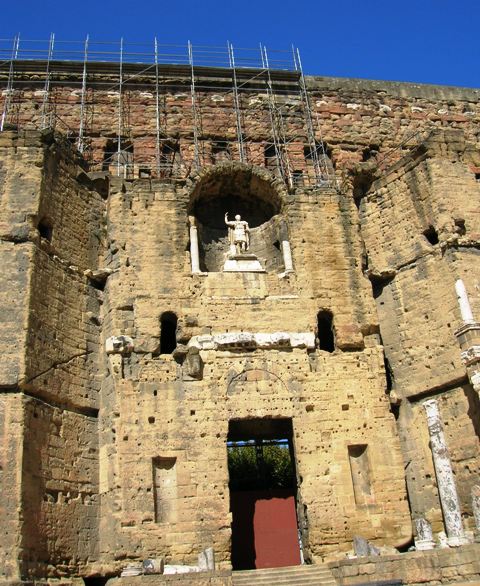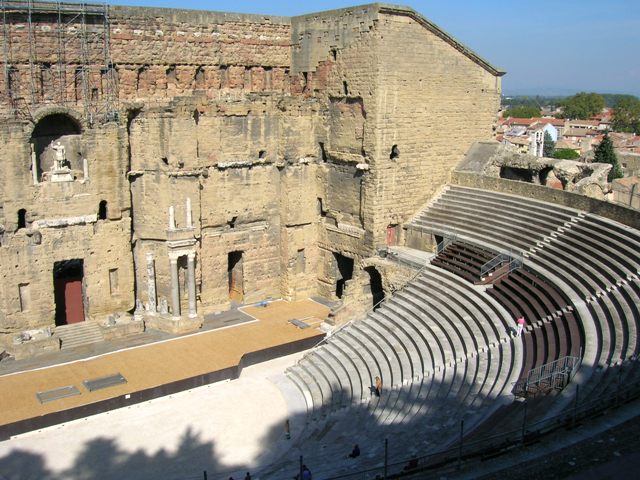Visit the Antique Theatre in Orange
Excerpt from the book On a Tall Budget and Short Attention Span from the Teresa the Traveler Series.
The next morning I took a short train ride to Orange so I could spend the day exploring their incredible Roman ruins. Located about 21 kilometers north of Avignon, Orange has a population of over 28,000 people. Not only is it the warmest city in France, it has the best-preserved stone theatre west of the Roman Empire.
|
Built in the first century AD, the 7,000 seat theatre played a major role in the lives of the citizens who lived in ancient Orange. In its prime, this theatre could house over nine thousand spectators. The wall of the stage is one hundred and three meters long and thirty-seven meters high with an 11 foot high statue of Emperor Augustus inset in the center.
Emperor Augustus, the first emperor of the Roman Empire, was born in Rome in 63 BC. His given name is Gaius Octavius, the same as his father, the governor of Macedonia, who married the niece of Julius Caesar. When Caesar was killed in an assassination plot by his senators, 19-year-old Octavian stepped in and was later given the title Augustus (the illustrious one) by the senate. I started my day at the antique theatre, one of many theatres in antiquity used by the Roman authorities both as a means of spreading Roman culture and also to distract the people from the political activities of the administration. The entertainment, which included mime, poetry readings and plays, was free of charge and open to everyone. I rented an audio guide and wandered through the theatre listening to stories about the actors who wore character masks never revealing their faces. Despite the facts these actors never showed their faces, some still became famous. How weird is that? When Christianity became the official religion of the Roman Empire the entertainment provided in such theatres was regarded as uncivilized spectacles. All the theatres were eventually shut down as was the Orange theatre in 391 AD by official edict. The theatre was abandoned, sacked by barbarians and later used as a defense post in the Middle Ages. Then during the 16thcentury religious wars it provided refuge for the citizens of Orange. I left the theatre and checked out some of Orange’s other sites including a 1st century Triumphal Arch, the remains of a Roman Temple and a beautiful 19thcentury theatre before returning to Avignon on one of the frequent trains. For tips on visiting France CLICK HERE
For tips on visiting Europe CLICK HERE For general travel tips on what to pack and how to plan ahead CLICK HERE For tips on travelling on a budget CLICK HERE |
|
|
|
Where I Stayed...
Hotel Alizea 38, cours Jean Jaures 84000 Avignon, France Tel: 04 90 82 03 21 Fax: 04 90 27 17 39 [email protected] |




